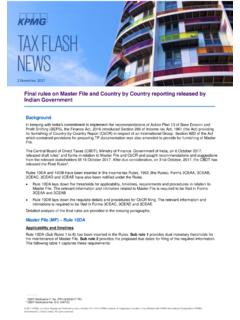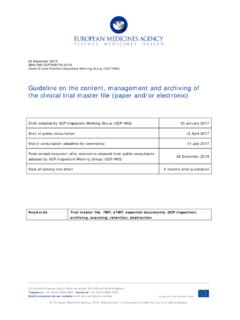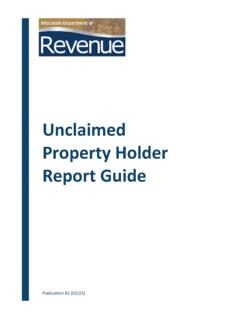Transcription of OECD Master File concept and CbC Reporting – international ...
1 Status: Master File concept and CbC Reporting international documentation requirements2 PreambleDear Reader,Due in part to public pressure, the OECD and G20 have adopted a BEPS action plan to counter tax avoidance and profit shifting (BEPS) by multinational corporate groups. To this end, an action plan was published in April 2013, providing 15 action points on which measures are to be developed and implemented in order to achieve the goal of preventing tax-aggressive of these action points dealt directly with transfer pricing issues. After the final report on Action 13 ( Transfer Pricing Documentation and Country-by-Country Reporting ) was published by the OECD in 2015, the three-tiered documentation approach consisting of Master File, Local File and Country-by-Country Reporting can now be found in the OECD Transfer Pricing Guidelines of July 2017.
2 Many legislators in the meantime implemented the OECD proposal in full or at least in part into national consequence of the three-tiered approach is that tax administrations gain a much deeper view into intra-group structures. Whether the perception of transfer pricing as a relevant audit focus or the increasing transparency of transfer pricing issues is the reason for increasing transfer pricing adjustments cannot be conclusively determined in individual cases. Nevertheless, experience shows that transfer pricing continues to receive increasing attention from tax a result of the current COVID-19 pandemic, it is to be expected that internationally represented groups of companies and their intra-group business relationships will once again come under increased scrutiny by the national tax authorities.
3 The considerable impact of the pandemic on the economy leads to the assumption that tax administrations want to save their tax revenue precisely by intensifying audits of international circumstances, such as transfer preparation for an upcoming tax audit, the best defence is a usable transfer pricing documentation. Uniform documentation rules help corporate groups to reduce their compliance costs. In addition to the formal differences in documentation that still exist in some cases, however, there are still differences in content in the individual countries, as well as a wide variety of preparation, notification and submission the individual tax Reporting obligations to which an internationally operating group of companies is subject is sometimes laborious and associated with uncertainty.
4 However, knowledge of the respective national implementation status is an essential compliance task for the transfer pricing management of international groups of companies in order to avoid formal errors and thus an initial target with regard to the usability of a this publication on 59 countries, we would like to provide you with an orientation aid. Although this does not allow any conclusive statements to be made about your company s individual documentation obligations, we believe that we have been able to provide you with a helpful initial overview. If you have any further questions, please do not hesitate to contact our international transfer pricing group at R dl & yoursMichael Scharf3 BEPS Action 13 6 Service Portfolio 8 Your added value 9 BEPS Action 13 state of implementation in selected countries 10 Country-specific regulations 12 Argentina 12 Australia 13 Austria 14 Belarus 15 Belgium 16 Brazil 17 Bulgaria 18 Cambodia 19 Canada
5 20 China 21 Croatia 22 Cyprus 23 Czech Republic 24 Denmark 25 Estonia 26 Finland 27 France 28 Georgia 29 Germany 30 Hong Kong ( ) 31 Hungary 32 India 33 Indonesia 34 Israel 35 Italy 36 Japan 37 Kazakhstan 38 Kenya 39 Contents45 Latvia 40 Liechtenstein 41 Lithuania 42 Luxembourg 43 Malaysia 44 Mexico 45 Netherlands 46 Nigeria 47 Philippines 48 Poland 49 Portugal 50 Republic Moldova 51 Romania 52 Russia
6 53 Serbia 54 Singapore 55 Slovakia 56 Slovenia 57 South Africa 58 South Korea 59 Spain 60 Sweden 61 Switzerland 62 Thailand 63 Tunisia 64 Turkey 65 Ukraine 66 United Arab Emirates 67 United Kingdom 68 USA 69 Vietnam 70 Country-by-Country- Reporting 71 Notification to the Tax Administration 71R dl & Partner 74 About us 74R dl & Partner worldwide 75 Contact 76 BEPS Action 13 Transfer Pricing Documentation and Country- by-Country Reporting6 Following the points of action developed in the context of the BEPS project against Base Erosion and Profit Shifting of multinational enterprises.
7 Countries implemented these actions as far as possible via changes in domestic law and practices and via treaty provisions in order to protect their respective national tax bases. The BEPS Action Point 13 ( 2015 Final Report Transfer Pricing Documentation and Country-by-Country Reporting ) provides guidance for Tax Administrations to improve transparency by developing rules and procedures on sufficient documentation in connection with risk assessment and transfer pricing inquiry. The proposed standardized three-tiered approach to Transfer Pricing Documentation for Multinational Enterprise (MNE) groups has replaced the former Chapter V of the OECD Transfer Pricing Guidelines in July 2017 and should consist of the following: (i) a Master File, (ii) a Local File, and (iii) Country-by-Country Reporting (CbCR).
8 The Master File contains standardized information relevant for all MNE group members and should provide a general overview of the MNE group business, placing the MNE group s pricing practices in their global economic, legal, financial and tax contexts. Compared to already existing Master File concepts, the chapters on intangible assets and financing in particular are new. In contrast to the Master File the Local File provides more detailed information relating to specific intercompany transactions for the respective domestic taxpayer to which the Local File third component of the three-tiered approach is CbC Reporting which is generally compiled only by MNE groups with annual consolidated group revenue equal to or exceeding EUR 750 million.
9 CbC Reporting requires aggregate tax jurisdiction-wide information related to the global allocation of income, taxes paid, and certain indicators of the location of economic activity among the tax jurisdictions in which the MNE group operates. The Master File and CbC Reporting will be helpful for risk assessment purposes. However, the Local File comprises information relevant to a detailed transfer pricing analysis for the relevant taxing authority for each country in which the MNE group is approachMaster File ( high-level overview )Risk assessmentCbC- Reporting ( high-level risk assessment )Local File ( specific IC transactions )Transfer pricing analysisIn practice, the ultimate parent company is required to prepare the Master File and share it with the constituent entities in order to comply with the documentation requirements.
10 The ultimate parent company has access to all essential tax information. Depending on the existing intercompany transactions, the individual country specific Local Files can be filed centrally by the ultimate parent company or can be independently filed by the local companies. The more interlinked and versatile the intercompany transactions between the individual associated enterprises are, the less the centralization of information filing will be feasible. In general, each ultimate parent company of a MNE group is obligated to file a CbC Report in the country where it is resident for tax purposes. The OECD concept includes an annual exchange of information received from the Reporting entities that is a resident for tax purposes in its jurisdiction with all other competent authorities of jurisdictions with respect to which it has an agreement in effect, and in which, on the basis of the information in the CbC Report, one or more constituent entities of the MNE group of the Reporting entity are either a resident for tax purposes, or are subject to tax with respect to the business carried out through a permanent countries have already implemented or made initial arrangements to implement BEPS Action Point 13 in domestic law.





